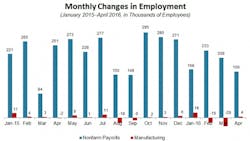Manufacturing Employment Rose in April after Following Sharp Declines in February and March
The current state of the manufacturing economy continues to be a give-and-take between signs that the sector is beginning to improve versus ongoing challenges related to global headwinds. The latest job numbers represent both of those views. On the one hand, manufacturers added 4,000 workers in April, a positive gain following two months of declines which was led by strength in the motor vehicle segment. Yet, hiring remained soft overall, with 23,000 fewer workers on net through the first four months of 2016. Indeed, manufacturing leaders remain cautious in their outlook, and as such, we continue to see weaker-than-desired job growth. Hopefully, that will improve moving forward, particularly if the manufacturing economy truly is beginning to stabilize.
Looking more closely at the April manufacturing job data, durable goods manufacturers added 6,000 workers on net, with nondurable goods employment down by 2,000. Sectors with the largest monthly gains were motor vehicles and parts (up 6,100), food manufacturing (up 1,700), miscellaneous nondurable goods manufacturing (up 1,400), fabricated metal products (up 1,300) and electrical equipment and appliances (up 800). In contrast, plastics and rubber products (down 1,600), machinery (down 1,200), primary metals (down 1,100) and nonmetallic mineral products (down 800) were among the sectors experiencing declining employment for the month. In all, 12 of the 19 major manufacturing sectors had reduced employment in April.
ShopFloor is the blog of the National Association of Manufacturers (NAM).
About the Author

Chad Moutray
Chief Economist, National Association of Manufacturers
Chad Moutray is chief economist for the National Association of Manufacturers, where he serves as the NAM’s economic forecaster and spokesperson on economic issues. He frequently comments on current economic conditions for manufacturers through professional presentations and media interviews and has appeared on various news outlets. In addition, he is the director of the Center for Manufacturing Research at The Manufacturing Institute, the workforce development and education partner of the NAM, where he leads efforts to produce thought leadership, data and analysis of relevance to business leaders in the sector.
Prior to joining the NAM, Mr. Moutray was the chief economist and director of economic research for the Office of Advocacy at the U.S. Small Business Administration from 2002 to 2010. In that role, he was responsible for researching the importance of entrepreneurship to the U.S. economy and highlighting various issues of importance to small business owners, policymakers and academics. In addition to discussing economic and policy trends, his personal research focused on the importance of educational attainment to both self-employment and economic growth.
Prior to working at the SBA, Mr. Moutray was the dean of the School of Business Administration at Robert Morris College in Chicago (now part of Roosevelt University). Under his leadership, the business school had rapid growth, both adding new programs and new campuses. He began the development of an M.B.A. program that began accepting students after his departure and created a business institute for students to work with local businesses on classroom projects and internships.
Mr. Moutray is the vice chair of the Conference of Business Economists, and he is a former board member of the National Association for Business Economics, where he is the co-chair of the Manufacturing Roundtable. He is also the former president and chairman of the National Economists Club, the local NABE chapter for Washington, D.C.
He holds a Ph.D. in economics from Southern Illinois University at Carbondale and bachelor’s and master’s degrees in economics from Eastern Illinois University. He is a Certified Business Economist™, where he was part of the initial graduating class in 2015.
In 2014, he received the Outstanding Graduate Alumni Award from EIU, and in 2015, he accepted the Alumnus Achievement Award from Lake Land College in Mattoon, Illinois, where he earned his associate degree in business administration. He serves on the external economics advisory board for the SIUC’s School of Analytics, Finance and Economics.
